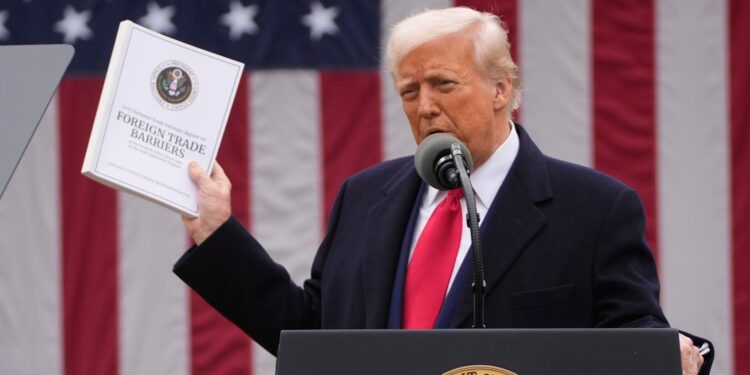Topline
White House press secretary Karoline Leavitt brushed off concerns about President Donald Trump’s widescale tariffs on foreign imports, claiming in interviews Thursday they would not cause “pain”—even as the stock market plunged and other Trump officials acknowledged there may be short-term consequences for Americans.
President Donald Trump speaks during an event to announce new tariffs in the Rose Garden at the … More White House on April 2.
Key Facts
Trump imposed tariffs on imports from nearly all foreign nations Wednesday, which has spurred fears of a recession and caused the stock market to take a nosedive, as the tariffs are projected to broadly increase prices for American consumers.
Leavitt downplayed concerns in an interview with NewsNation, claiming there’s “not going to be any pain [from the tariffs] for American-owned companies and American workers” and that Americans can “expect price stability” and “to buy American” as a result of the tariffs, also claiming “they can expect their wages to go up.”
In a separate interview with CNN, the press secretary deflected questions about the short-term pain Trump’s tariffs will cause as a result of higher prices, saying only that the president is working “every single day” on easing Americans’ economic pain and is taking a “whole-of-government” approach to the economy that includes tariffs, getting rid of regulations and cutting taxes.
Leavitt’s comments stand in sharp contrast to economic experts who have warned Trump’s tariffs could have a dire impact on the U.S.’ economy, with JPMorgan Chase’s chief economist saying Thursday morning the president’s policies will “take the economy perilously close to slipping into recession.”
Her optimism also comes as Vice President JD Vance acknowledged to Fox News on Thursday that any expected economic benefits of Trump’s tariffs won’t be immediate, asking Americans to “appreciate … that we’re not going to fix things overnight” and saying, “We’re fighting as quickly as we can to fix what was left to us, but it’s not going to happen immediately.”
Crucial Quote
“To anyone on Wall Street this morning, I would say, ‘Trust in President Trump,’” Leavitt told CNN in response to the chaos in the markets Trump’s tariffs have caused. The White House spokesperson said the president is “doubling down on his proven economic formula from his first term,” and claimed the markets aren’t taking into account “the massive revenue that these tariffs are going to bring into the United States.”
What Has Trump Said About The Tariffs?
Trump reiterated his support for his tariffs Thursday morning, saying on Truth Social, “THE OPERATION IS OVER” and “THE PATIENT LIVED, AND IS HEALING.” “THE PROGNOSIS IS THAT THE PATIENT WILL BE FAR STRONGER, BIGGER, BETTER, AND MORE RESILIENT THAN EVER BEFORE,” Trump continued, adding, “MAKE AMERICA GREAT AGAIN!!!”
What Have Other Trump Officials Said About Tariffs?
In addition to Leavitt and Vance, Commerce Secretary Howard Lutnick also downplayed the tariffs Thursday morning, acknowledging to CBS News that while “foreign goods may become a little more expensive … domestic goods [will] not.” “So for the first time in your lives you’re gonna actually think about the Americans who make the products,” Lutnick argued.
When Will The Tariffs Take Effect?
According to the White House, 10% tariffs will take effect on foreign imports at 12:01 a.m. EDT on Saturday morning, while higher tariff rates on many countries’ goods will then take effect on April 9. Tariffs on imported cars and trucks took effect more immediately on Thursday, though automotive parts won’t have tariffs levied until May 3. The tariffs will remain in effect “until such a time as President Trump determines that the threat” posed by another country’s trade with the U.S. and taxes on U.S. goods is “satisfied, resolved, or mitigated,” the White House said.
Key Background
Trump announced his widespread reciprocal tariffs on foreign goods Wednesday in an event at the White House, as the president fulfilled a longtime campaign promise to levy tariffs on most imports. The tariffs affect nearly all countries—the tariff list even included uninhabited islands—save for countries that already face high sanctions like Russia and North Korea. Trump has also already imposed tariffs on Canada and Mexico and didn’t have any additional taxes levied on them, though imports from China will now face 54% tariffs after Trump added an additional 34% tax on goods from the country on top of tariffs that were already in place. The president has pushed forward with his plan for tariffs even as they’ve been politically unpopular among Americans and widely decried by economists, who have long projected any widespread tariffs would raise the cost of goods and destabilize the economy. Major stock indexes recorded their biggest losses since 2020 on Thursday morning as the stock market plunged in response to the tariffs, with tech stocks like Apple and retail giants like Best Buy, Target and Nike all registering particularly large losses.
Further Reading
ForbesHere’s The Full List Of Trump’s Reciprocal Tariffs Announced WednesdayBy Molly Bohannon
ForbesTrump Announces Reciprocal Tariff Rates—54% For China, 20% On EU (Live Updates)By Sara Dorn
Topline
White House press secretary Karoline Leavitt brushed off concerns about President Donald Trump’s widescale tariffs on foreign imports, claiming in interviews Thursday they would not cause “pain”—even as the stock market plunged and other Trump officials acknowledged there may be short-term consequences for Americans.
President Donald Trump speaks during an event to announce new tariffs in the Rose Garden at the … More White House on April 2.
Key Facts
Trump imposed tariffs on imports from nearly all foreign nations Wednesday, which has spurred fears of a recession and caused the stock market to take a nosedive, as the tariffs are projected to broadly increase prices for American consumers.
Leavitt downplayed concerns in an interview with NewsNation, claiming there’s “not going to be any pain [from the tariffs] for American-owned companies and American workers” and that Americans can “expect price stability” and “to buy American” as a result of the tariffs, also claiming “they can expect their wages to go up.”
In a separate interview with CNN, the press secretary deflected questions about the short-term pain Trump’s tariffs will cause as a result of higher prices, saying only that the president is working “every single day” on easing Americans’ economic pain and is taking a “whole-of-government” approach to the economy that includes tariffs, getting rid of regulations and cutting taxes.
Leavitt’s comments stand in sharp contrast to economic experts who have warned Trump’s tariffs could have a dire impact on the U.S.’ economy, with JPMorgan Chase’s chief economist saying Thursday morning the president’s policies will “take the economy perilously close to slipping into recession.”
Her optimism also comes as Vice President JD Vance acknowledged to Fox News on Thursday that any expected economic benefits of Trump’s tariffs won’t be immediate, asking Americans to “appreciate … that we’re not going to fix things overnight” and saying, “We’re fighting as quickly as we can to fix what was left to us, but it’s not going to happen immediately.”
Crucial Quote
“To anyone on Wall Street this morning, I would say, ‘Trust in President Trump,’” Leavitt told CNN in response to the chaos in the markets Trump’s tariffs have caused. The White House spokesperson said the president is “doubling down on his proven economic formula from his first term,” and claimed the markets aren’t taking into account “the massive revenue that these tariffs are going to bring into the United States.”
What Has Trump Said About The Tariffs?
Trump reiterated his support for his tariffs Thursday morning, saying on Truth Social, “THE OPERATION IS OVER” and “THE PATIENT LIVED, AND IS HEALING.” “THE PROGNOSIS IS THAT THE PATIENT WILL BE FAR STRONGER, BIGGER, BETTER, AND MORE RESILIENT THAN EVER BEFORE,” Trump continued, adding, “MAKE AMERICA GREAT AGAIN!!!”
What Have Other Trump Officials Said About Tariffs?
In addition to Leavitt and Vance, Commerce Secretary Howard Lutnick also downplayed the tariffs Thursday morning, acknowledging to CBS News that while “foreign goods may become a little more expensive … domestic goods [will] not.” “So for the first time in your lives you’re gonna actually think about the Americans who make the products,” Lutnick argued.
When Will The Tariffs Take Effect?
According to the White House, 10% tariffs will take effect on foreign imports at 12:01 a.m. EDT on Saturday morning, while higher tariff rates on many countries’ goods will then take effect on April 9. Tariffs on imported cars and trucks took effect more immediately on Thursday, though automotive parts won’t have tariffs levied until May 3. The tariffs will remain in effect “until such a time as President Trump determines that the threat” posed by another country’s trade with the U.S. and taxes on U.S. goods is “satisfied, resolved, or mitigated,” the White House said.
Key Background
Trump announced his widespread reciprocal tariffs on foreign goods Wednesday in an event at the White House, as the president fulfilled a longtime campaign promise to levy tariffs on most imports. The tariffs affect nearly all countries—the tariff list even included uninhabited islands—save for countries that already face high sanctions like Russia and North Korea. Trump has also already imposed tariffs on Canada and Mexico and didn’t have any additional taxes levied on them, though imports from China will now face 54% tariffs after Trump added an additional 34% tax on goods from the country on top of tariffs that were already in place. The president has pushed forward with his plan for tariffs even as they’ve been politically unpopular among Americans and widely decried by economists, who have long projected any widespread tariffs would raise the cost of goods and destabilize the economy. Major stock indexes recorded their biggest losses since 2020 on Thursday morning as the stock market plunged in response to the tariffs, with tech stocks like Apple and retail giants like Best Buy, Target and Nike all registering particularly large losses.
Further Reading
ForbesHere’s The Full List Of Trump’s Reciprocal Tariffs Announced WednesdayBy Molly Bohannon
ForbesTrump Announces Reciprocal Tariff Rates—54% For China, 20% On EU (Live Updates)By Sara Dorn














